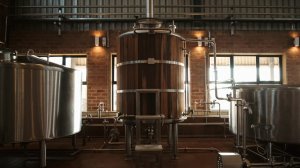Brewery industry embraces sustainable practices

Beer Association of South Africa CEO Charlene Louw and Hazeldean Brewing Company founder, owner and operator Marius Botha discuss sustainability in the South African brewing sector
Brewing is not only a resource-intensive but also a water-intensive operation, and only through more sustainable practices can the South African beer-brewing sector assert itself as a sustainable and environmentally responsible industry, says professional body Beer Association of South Africa (Basa) CEO Charlene Louw.
The various stages of the brewing process use a lot of water; consequently, it is critical that brewers source natural water, recycle or treat process water and/or minimise overall water use.
“Water is crucial for washing raw materials, sanitising facilities and then, as the core ingredient, using between 4 ℓ to 7 ℓ of water to manufacture 1 ℓ of finished beer in a large-scale brewing facility,” she adds, noting that craft breweries and smaller setups could use 10 ℓ to produce 1 ℓ of product.
Louw points out that energy consumption is also a major cost for the brewery industry, which means that energy efficiency and cleaner energy are considerable factors.
Further, embracing circular systems to reduce waste and costs is as important as water conservation.
These sustainable practices are being increasingly championed by smaller local brew houses and have been successfully championed by Pretoria-based brewery and taproom Hazeldean Brewing Company.
The brewery, located on a working stud farm and destination venue, was designed using a closed-pipe system, enabling the brewery to contain all the water and the chemicals it uses, Hazeldean Brewing Company founder, owner and operator Marius Botha tells Engineering News.
Water Retention
The brewing process uses cold water to chill the wort – which is essentially the sugar water that will eventually become beer – from near boiling to about 12 °C or 20 °C.
During this process, the cold water absorbs heat from the wort and warms up, and that heated water is redirected back into the hot liquor tank.
“This approach saves energy because it allows the brewing system to reuse the warmed water, rather than starting with cold tap water every time and reheating it to boiling.”
Consequently, the process forms a type of closed-loop cycle that conserves water and energy.
“Heat exchangers are critical for energy and water efficiency, as they use a hot stream of wort to preheat cold brewing water or [are used] to cool wort, thereby reusing the thermal energy.”
Botha adds that the water used by the farm and brewery is sourced from boreholes on the farm and is only put through a filtration and softening process when required for certain brews or beer styles.
Taxing Topic
Louw stresses that over-taxation is one of the major challenges facing the brewing industry.
“While it is a highly regulated sector – and rightly so, given the nature of the product – the tax burden has become excessive,” says Louw, adding that regulations help to ensure responsible production and consumption, and Basa and the industry fully support them.
However, current tax levels are cutting into brewers’ margins, especially for smaller producers trying to enter the retail market.
With nearly 40% of the price of a 330 mℓ beer going to taxes, including excise and value-added tax, it becomes difficult for smaller brewers to remain competitive.
“As an association, we actively lobby and engage with government to create a more enabling regulatory environment, one that enables the industry to grow, generate employment and contribute even more to the economy,” she avers.
Brewing, as an industry, contributes about R98-billion to South Africa’s GDP and sustains over 210 000 jobs, which, in a climate of high unemployment and widespread job cuts, underscores the fact that the industry “deserves protection and support”.
“Our role is to ensure that policymakers understand the challenges and work with them to ease some of the strain on brewers.”
Meanwhile, the industry also plays a vital role in supporting the agriculture and tourism sectors.
Basa members, such as beer producer South African Breweries (SAB), are over 90% localised, sourcing barley, hops and wheat from farmers across the Western Cape and North West provinces.
Through initiatives and partnerships, such as FarmSol, SAB provides development funding, interest-free loans and training to help farmers improve their yields and remain sustainable.
Similarly, global beer brewing company Heineken’s partnership with French multinational malt producer Soufflet Malt to establish a malting plant in South Africa will further strengthen local production and create new employment opportunities.
“These efforts reflect how deeply interconnected the brewing industry is with [other sectors] and local economic development, sustaining jobs and driving growth throughout the value chain,” concludes Louw.
Article Enquiry
Email Article
Save Article
Feedback
To advertise email advertising@creamermedia.co.za or click here
Announcements
What's On
Subscribe to improve your user experience...
Option 1 (equivalent of R125 a month):
Receive a weekly copy of Creamer Media's Engineering News & Mining Weekly magazine
(print copy for those in South Africa and e-magazine for those outside of South Africa)
Receive daily email newsletters
Access to full search results
Access archive of magazine back copies
Access to Projects in Progress
Access to ONE Research Report of your choice in PDF format
Option 2 (equivalent of R375 a month):
All benefits from Option 1
PLUS
Access to Creamer Media's Research Channel Africa for ALL Research Reports, in PDF format, on various industrial and mining sectors
including Electricity; Water; Energy Transition; Hydrogen; Roads, Rail and Ports; Coal; Gold; Platinum; Battery Metals; etc.
Already a subscriber?
Forgotten your password?
Receive weekly copy of Creamer Media's Engineering News & Mining Weekly magazine (print copy for those in South Africa and e-magazine for those outside of South Africa)
➕
Recieve daily email newsletters
➕
Access to full search results
➕
Access archive of magazine back copies
➕
Access to Projects in Progress
➕
Access to ONE Research Report of your choice in PDF format
RESEARCH CHANNEL AFRICA
R4500 (equivalent of R375 a month)
SUBSCRIBEAll benefits from Option 1
➕
Access to Creamer Media's Research Channel Africa for ALL Research Reports on various industrial and mining sectors, in PDF format, including on:
Electricity
➕
Water
➕
Energy Transition
➕
Hydrogen
➕
Roads, Rail and Ports
➕
Coal
➕
Gold
➕
Platinum
➕
Battery Metals
➕
etc.
Receive all benefits from Option 1 or Option 2 delivered to numerous people at your company
➕
Multiple User names and Passwords for simultaneous log-ins
➕
Intranet integration access to all in your organisation



















